There are two versions of history we hear about Jewish-Muslim relations. On the one hand, some make out like it’s a story of constant war and animosity, dating back over centuries. On the other hand, some want to say that it was a matter of complete harmony and coexistence until Israel came along. Neither is true.
Both stories are told more for ideological reasons than factual ones. The people who say it’s a story of endless struggle want to justify their prejudices, foster divisions and make their nationalist answers seem like the only solutions. Normally, that story is nothing more than Zionist propaganda.
Those who say everything was always fine do so because they want us to believe that the world is already a nice place, where people do get along really, and if we just got rid of a few of the bad things we could all sit around knitting rainbows. Anti-Semitism didn’t begin with Zionism, even among Muslims.
But there is no truth in the idea that Jews and Muslims were always in conflict. Even a cursory glance at history will show that’s not the case. And the world isn’t really a nice place. It is full of inequalities, divisions and problems that inevitably affect how Jews and Muslims relate to each other.
So what is the real story? Religions are always responses to the societies they’re in. Judaism and Islam aren’t static objects that stand through time unchanged. Instead, both have responded to world events, economic disaster and environmental catastrophe throughout the ages. The simple and complicated truth is really that, when resources have been plentiful and shared, relations have usually been good. In times of economic hardship and political collapse, relations have generally been bad.
The answer to division is, was, and always has been socialism: the complete political and economic equality of people.
I want to give an overview of history to show what I mean. I’m going to look at some of the main events in relations between Jews and Muslims up to the present day. I’ll show you how these relations have really been defined by power, economics, money and empires. And I hope that by giving a real history we can imagine a real future. The answer to division is, was, and always has been socialism: the complete political and economic equality of people.
This is going to be a long article. Grab a cup of tea or pull your ashtray close because you can’t fit centuries of goings-on between two of the world’s greatest religions into tweetable soundbites. If you can’t be arsed to read the whole thing, I suggest skimming over the quotes in the main sections and then skipping to the end – that’s where the politics are.
The Time of Prophets
If you watch Channel 4 “exposes” or hard-hitting BBC “documentaries” you’d be under the illusion that the Qur’an is a fundamentally anti-Semitic book. In these so-called factual programmes, off-camera, authoritative voices cherry-pick and mistranslate quotations to make Islam look like a violent religion, completely intolerant of any other belief systems. I sometimes wonder if the reason we get fundamentalists is just because people spend far too much time watching the news and wind up believing it’s true.
“The people of the book”, that is, those who follow the stories of the prophets from Abraham onwards, were to be seen as friends of Islam.
The Qur’an is not anti-Jewish. In almost every chapter, you see it repeated that Jews, Christians and Sabians are fine. “The people of the book”, that is, those who follow the stories of the prophets from Abraham (a”h) onwards, should be seen as friends of Islam. The Qur’an often repeats that “those who believe in judgement and the last day”are G-d’s people, and regularly goes to pains to make clear this includes Jews and Christians. (Sabians no longer exist, possibly because they were celibate monks, but nobody’s quite sure.)
During the time of Mohammed (pbuh), he saw very little conflict with Jews. Most of the Qur’an was written in times of peace. There were occasions, at the time when the Muslim prophet was conquering Medina, that there were some tensions between Jews and Muslims. There, we can find some passages critical of Jews, in the context of a very complicated conflict, but none of them actually advocate violence against Jews for being Jews.

What groundwork was set by the Qur’an of religious tolerance was certainly cemented by the caliphs that succeeded Mohammed (pbuh). Among these, the most notable for Jewish history was Umar. He was a companion of the prophet who ruled over the first Muslim empire for ten years. During his reign, the empire expanded tremendously and saw great wealth.
Umar set out the terms for Jews living in Muslim lands, that is still considered the defining document of sharia law in this regard. According to the Pact of Umar, Jews would be protected citizens (or dhimmis), with full religious and political rights, so long as they adhered to certain rules. Jews had to pay taxes (jizya) to the Muslim rulers where they lived, Jews must be loyal to their political leaders and Jews could not own Muslim slaves. Beyond these economic rules, Jews should be expected to enjoy complete freedom in Muslim lands.
This pact really went on to define exactly how Jews would live in Muslim countries. Throughout most of history, Jews made themselves loyal and useful to the empires they lived in and Muslim rulers responded by giving them protection and freedom. For the most part, these rules functioned well and were adopted by all Muslim countries. Even Iran, today often associated with anti-Semitism, still practises this aspect of sharia and actually has the second-largest Jewish population in the Middle East after Israel. However, as you’ll see, the success of this pact really depended on how stable and prosperous was the society that was practising it.
The Golden Ages
It is probably not a coincidence that many of the great eras for Muslims were also golden ages for Jews. Two of these are worth mentioning here: the caliphate of Haroun al-Rashid from 766-809 and the Andalusian golden age from the time of Muslim conquest to the invasion by the Almoravides.
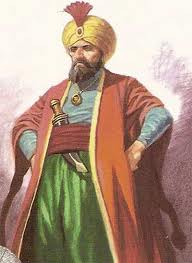
Haroun al-Rashid led an empire that stretched from Armenia and Azerbaijan as far as Tunisia. His rule saw great wealth and prosperity. In that context, art, sciences and literature were able to thrive. It was during this period that much of the Thousand and One Nights was written, as well as many of the famous advances in algebra, physics and medicine. Jews flourished in this caliphate and were able to take up court positions as writers, advisers and artists.
It would be a mistake here to pretend that great wealth is a neutral fact. Many African writers have pointed to the fact that much of the early Arabic empires’ wealth was pillaged from Black people. Certainly, the prosperity of these empires was a disaster for other nations, who were looted in the process, and even for poorer Jews and Muslims. What is notable here, however, in the context of Jewish-Muslim relations, is that both Jews and Muslims were able to obtain roles of great political and cultural prominence, without being hindered by their religions (so long as they were wealthy).
Poorer Jews and Muslims were known to meet at local markets and wealthy Jews and Muslims would often smoke weed together
For Jews, there was a period arguably even greater than the caliphate of Haroun al-Raschid. That was the Golden Age of Hebrew Literature. It took place in Andalusia, southern Spain, and lasted centuries. When the Muslims first invaded southern Spain in the 8th Century, they gave Jews full religious and political freedom.
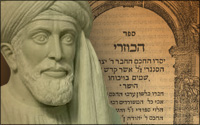
Throughout their rule, Jews and Muslims enjoyed great friendships. Poorer Jews and Muslims were known to party together and meet at local markets. Documents from the time show that wealthy Jews and Muslims would often smoke weed together. The country was very wealthy and many Jews took on positions as translators and physicians at the higher levels of society, and as butchers and leather-tanners at the lower levels.
In this context, Jewish literature abounded. Great rabbis like Yehuda ha-Levi, Solomon ibn Gabirol and Samuel ha-Nagid wrote works of prayer and poetry that are still regularly used today. Philosophers like Maimonides codified Jewish thought and laid out what would become known as Sephardi Judaism. (Sefarad is the Hebrew word for Spain).
This lasted really for as long as that area was prosperous. In 1033, much of the wealth dried up and the Caliphate of Cordoba ended. Only three decades later, faced with poverty and uncertainty, Muslims turned on the Jews and killed thousands of them, including vizier Joseph ibn-Naghrela, in what became known as the Grenada massacre of 1066.
After this pogrom, many Jews fled to England, which had come under new management, and Jews hoped might be a safe haven. (They were very wrong, but the story of persecution of Jews by Christians in Northern Europe is better known, and this isn’t the place to tell it.)
Spain then saw conquests by the Almoravids and the Almohads from Morocco. Inequality and uncertainty defined both Jewish and Muslim existence in this period. Both groups became more austere and, although Jews continued to live in key cities like Cordoba and Seville, the great era of the two religions sharing ideas and friendships had really ended. This trend isn’t just limited to Jews and Muslims, but is true in all times of disaster, independent of religions.

Expulsion and Diaspora
The nail in the coffin of Jewish-Muslim coexistence in Spain came in 1492. Christians in the north came and took over the entire Iberian peninsula. As they went, they murdered Jews and Muslims and forced full conversion to Catholicism by everyone in their wake. Even after having massacred many, the Church set up the Inquisition, to root out anybody still practising Judaism or Islam – and torture them.
Where did they go to escape this Christian oppression? To Muslim countries, of course.
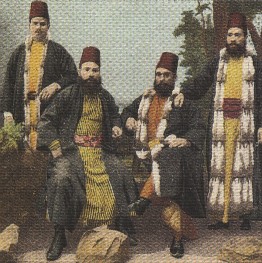
Faced with this persecution, some Jews continued to practise their religion in secret, but most fled. Where did they go to escape this Christian oppression? To Muslim countries, of course. A large number moved to Morocco and Tunisia. Today, along the whole of the western North African coast, you can still find synagogues and Jewish homes. The Moroccan-Jewish diaspora is now estimated to be around 2-3million people.
Many also moved to the Ottoman Empire. There is an apocryphal story that when the Spanish Christians imprisoned Jews after 1492, the Ottoman sultan sent out an edict to them saying it was illegal to imprison them since they were citizens of the Ottoman empire. The sultan saw there that what was Spain’s loss could be his gain. The skills they could bring, such as translation services, would be invaluable to his empire. Since the Ottomans were, at that time, the big boys on the block, Spain couldn’t really refuse so the Jews were rehoused.
So Jews made prominent settlements in Istanbul, Izmir and Salonica. Here, once again, Jewish culture thrived and – although it saw some natural disasters such as a great fire – the community was able to continue living its life. There were plenty of Ladino-language newspapers, an entire work of religious rite (Meam Loez), as well as Sephardi-Jewish feminist and socialist movements.
A wealthy nation with plenty of resources was simply an easier place for cosmopolitanism to thrive
It’s worth noting here that the Ottoman empire may well have been friendly partly because it was Muslim-ruled but that, more importantly, as a wealthy nation with plenty of resources, it was simply an easier place for cosmopolitanism and difference to thrive. Jews had to leave one Muslim-led country because, in poverty and austerity, people had turned on one another, for another Muslim-led country where, in prosperity, people were more in relative harmony with one another.
European colonisation
As the Ottoman empires began collapsing, Europe came out of its Dark Ages. No longer small, warring states plagued by disease, countries such as Britain, France and the Netherlands sought to establish their own empires. To do so, they took over huge swathes of Africa and the Middle East.
European kings would take credit whenever things went right and blame Jewish scapegoats whenever things went wrong.
One of the main things the European powers had learnt through the Middle Ages was how to use Jews. Jews were vulnerable and lived a precarious existence, so were always likely to be pliable to the demands of the ruling class. At the same time, they were educated and had brought to Northern Europe with them Arabic maths and administration skills.
To take advantage of this, European kings gave Jews despised positions, especially in money-lending, tax collection and administration. That way, they could gather in profits and use the money Jews collected and lent to fund their wars and lifestyles. When crises hit and it all went tits up, the ruling class could shirk the blame by saying that, after all, it was the Jews who’d been handling the money. They used this situation to take credit whenever things went right and blame Jewish scapegoats whenever things went wrong.
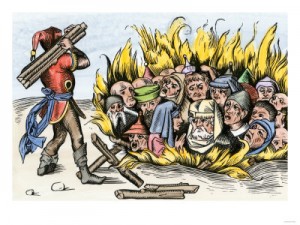
When the European powers colonised the Middle East and North Africa, they brought with them not only their language, education system and diseases, but also their skills in how to use and abuse Jews. In places as diverse as Tunisia, Lebanon and Iraq, Jews were put into positions handling money and communicating colonial edicts.
European Christians literally brought Jewish blood libel to the Middle East.
The Jews put in this position, of course, could not refuse, knowing they were vulnerable, although many were very active in anti-colonial struggles. Unfortunately, the heavy Jewish participation in liberation campaigns has been largely forgotten and the narrative of Jews’ role in colonialism has stuck. That’s why, for example, there is still bitterness and resentment from many Algerians towards Jews, beyond the Palestinian struggle. The European scapegoating method did its job.
As if that weren’t enough, the Northern Europeans also imported their own anti-Semitic myths and Jew-baiting hatred to the south. There were two main cases of blood libel in Muslim lands. Both took place in 1840. Both were completely instigated and encouraged by European Christians.
The first was in Damascus. There, a Capuchin friar, Father Thomas, was surprisingly murdered and disappeared. The French consulate there, without any investigation, immediately blamed the Jews. They stoked up the local community with lies that Jews used Christian blood as part of a ritual sacrifice. They took several Jewish community leaders, imprisoned and tortured them. Incensed by the French lies, the local Muslim community ransacked the synagogue, pillaged it and destroyed the Torah scrolls. Of course, a later investigation proved that Jews had had nothing to do with that murder.
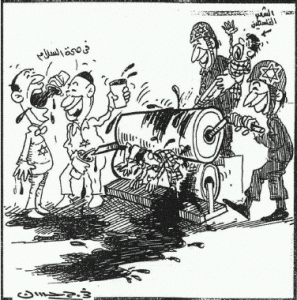
The next was in the Ottoman port city of Rhodes, only a few weeks later. Two guards claimed that they’d seen a young boy enter the city but had never seen him again. The British sprung on this and instantly spread rumours that Jews captured children to grind up their bones for Passover feasts. Their forces beseiged the Jewish quarter, depriving them of food and water for days on end in the searing heat. A Muslim court looked into it and found there was no evidence for the blood libel and so the troops should stand down. They refused. One local Muslim general took pity and, with his own money, bought bread for the beseiged Jewish population. For this, he was summarily sacked. The local rabbi was taken in and tortured with hot coals for three days, but refused to confess. It later transpired that the boy who they’d been accused of killing never actually existed.
The European ruling class did all they could to manipulate Jews for their own nefarious ends
It’s worth stating clearly here that European Christians literally brought Jewish blood libel to the Middle East. Most of the anti-Semitic myths propogated in Muslim countries were completely European-grown and actively promoted by the new colonial powers.
You would think that Western audacity would stop there. Never ones to miss an opportunity, the British then wrote to the Ottoman ambassadors saying they were concerned that Jews weren’t safe in the Ottoman empire and so, naturally, Britain should step in and provide troops in Palestine, relocate some of its Jews there and personally oversee the “protection” of Jews. At this time, Zionism was less than even a fringe political movement in the Jewish community. Its greatest proponents, like Herzl and Jabertinsky, hadn’t even been born. The Ottomans, of course, rejected this early Zionist proposal as a shamless assault on their sovereignty.
The Europeans did all they could to manipulate Jews for their own nefarious ends. The French, British and Dutch empires took their own Jew-hatred and stoked it up in their new colonies. Despite this fact, it still struggled to find fertile soil for some time. That is, until the collapse of empires and the emergence of nation-states.
From empires to nation-states
We tend to think of nation-states as these timeless institutions that have always governed us. In reality, the collapse of the empire system only really began to end at the beginning of the 20th Century. Most states, as they’re currently formed, aren’t that much older than Israel. Israel just seems so new because of how many people were so quickly transported there to set it up.
The ruling powers have funded different fighting factions, constantly switching their allegiances to maximise conflict.
As shown, the policy of Western powers had long been to divide and rule their populations, using Jews as scapegoats. I know I will attract great ire from readers for oversimplifying here, but I don’t think the establishment of the state of Israel was a remarkable departure from that policy.

Winston Churchill, not yet Prime Minister and still busy building concentration camps to murder Zulus in South Africa, wrote his essay “Zionism versus Bolshevism”. In it, he made explicit that divide and rule was his intention. He bemoaned Jewish socialism and argued that if Jews could be deterred from it to a nationalist cause, the “Marxist menace” might vanish. He was shameless in arguing that Zionism would disempower Jews in Europe and could provide the British Empire with a useful ally in the Middle East.
As it became clear their empires were collapsing, this was exactly how colonial powers went about carving up the Middle East. Lines were drawn arbitrarily, splitting up religious and social groups so they would be constantly in conflict. Today, leaders in the USA and EU continue to exploit those differences, pitting Sunnis against Shiites, Kurds against Arabs, Alevis against Druze. You can find no clearer example of that than in the Syria war, where ruling powers have funded different fighting factions, constantly switching their allegiances to maximise conflict. A divided Middle East is easier for them to control.
By this time, European anti-Semitism was already gaining traction in some Muslim countries. In 1941, when the pro-Hitler leader of Iraq, Rashid Ali, was deposed by British invasion in the Anglo-Iraq war, the Jewish community took the brunt of it. Ali had aligned himself with Germany in the hope of staving off British control of Iraq’s oil. As part of their alliance, Ali’s government recorded and blasted out German propaganda in Arabic, which described Jews as treacherous vermin. As a result, when Ali’s government fell, his supporters blamed the only people in the area weak enough for them to attack: Baghdad’s Jews. They murdered hundreds and injured thousands in what became known as the Baghdad Pogrom, or Farhud. You’ll note, of course, that once again, European powers were happy to use Jewish bodies as human shields to deflect rebellions against them.
European powers were happy to use Jewish bodies as human shields to deflect rebellions against them.
That’s not to say Jews were universally loathed by Muslims. Quite the opposite. In some places, local Muslim populations were reluctant to see their Jewish citizens leave at the founding of Israel. Not because they were already fervent anti-Zionists, but because they were their neighbours, and they didn’t want them to leave. For those in southern Morocco, who’d enjoyed good relations with their Jewish neighbours for centuries and never been segregated, Jews making aliyah was a very sad event. For Muslims in southern Turkey, persecuted alongside their fellow Jews for both being Kurds, the loss of the Jews meant greater weakening of their communities. In these places where Jews and Muslims had succeeded and suffered together, Israel’s establishment was a rupture to their lives.
Israel and Zionism
So, in light of this history, the state of Israel was formed. (It is an interesting footnote to history that, although the USA was the first to recognise Israel, the second was in fact Iran.) For Palestinians, and many Muslims around the world, that declaration in 1948 is considered the Nakba – catastrophe. It meant the mass displacement of massacre of Palestinians, which continues to the present day. I need not elaborate too much on how genuinely disastrous the state of Israel has been for the Palestinians. The facts of millions of refugees, an enormous Separation Wall, well-documented human rights abuses and seemingly incessant bombing campaigns really speak for themselves.Those facts draw great righteous anger from many.
In Israel itself, stuck in a nationalist fervour and committed to a never-ending military occupation, Muslims are demonised.
It is a fact that is still exploited by many rulers to their own end. America trumpets its support for Israel – not, as conspiracy theorists claim, because Jews are controlling the White House – but because it is in their military interests to pander to one group and pit it against the others. Many Zionists are painfully aware that such support is unstable and will cease as soon as Israel ceases to be useful to Washington, which may come sooner than expected.
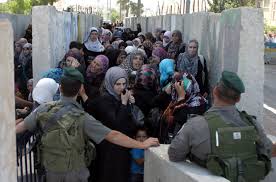
At the same time, many Arab leaders will make much of opposing Zionism to stave off internal conflicts at home. Deposed Egyptian dictator Hosni Mubarak used to routinely stir up anti-Zionist and anti-Jewish rhetoric when faced with difficulties at home. At the same time, he supported the seige of Gaza by keeping closed the Rafa crossing, was deeply hostile to the Palestinian liberation movement and actually enjoyed a close personal friendship with Netenyahu.
This leaves Jewish-Muslim relations deeply strained. In Arab countries, Jews are now mostly, at best, a memory from previous generations. At worst, they are the enemy of Muslims, responsible not only for murder of Muslims in Palestine, but around the world. The grey-shade, in between, is a strong sense of resentment at how Jews have acted in Israel. In Israel itself, stuck in a nationalist fervour and committed to a never-ending military occupation, Muslims are demonised. Muslims are monstered by Israelis in everything from political addresses to school textbooks.
Feeling helpless, a very small minority of Muslims, particularly in areas like the Parisian banlieus where Jews and Muslims are both very poor, get caught up in fanaticism and turn to violence.
The main area where Jews and Muslims interact today is in Europe, where both are diasporas. Seeing the atrocities committed by Israel against their co-religionists, many Muslims are deeply angry. Seeing Arab states as hypocrites and Israel as practically untouchable, many feel they have nowhere to turn their anger but against Jews. That’s why we see the terrorist attacks against Jews such as those in Copenhagen, Paris and Brussels over the last year. Feeling helpless, a very small minority of Muslims, particularly in areas like the Parisian banlieus where Jews and Muslims are both very poor, get caught up in fanaticism and turn to violence.
At the same time, Jews across Europe and beyond have never really recovered from the sense of persecution and fear left by the Holocaust and successive pogroms. Seeing Israelis at war with Palestinians in the Middle East, many European Jews have concluded that Muslims are the new enemy. Of course, this distracts deeply from the fact that their oppressors are the same as they have always been – the capitalists in Europe who put them into concentration camps and slavery.
This is a time when the wealthiest in the world are grabbing wealth on an unprecedented scale. It makes sense that the ruling class will seek to divide Jews from Muslims, and pit the two against Christians. As we’ve seen, this is how leaders function in inequality and instability.
(Wow, you’ve made it this far – just one more section to go!)
Socialism or barbarism
This is not to say that Jewish-Muslim relations today are completely bleak. There are countless examples of solidarity. In Bradford and Tower Hamlets, mosques have stepped in to save synagogues from closure. In Oslo last week, Muslims formed a ring of peace to protect their local Jewish population at prayer. After a Muslim centre was fire-bombed in Muswell Hill two years ago, the local Jewish community turned out to show their solidarity. This is all to say that, in places where Jews and Muslims feel a sense of common struggle and refuse to be divided by political powers, the two groups not only coexist but support and strengthen each other.
Imagine a different future for us
This is, essentially, what I’m driving at. When we have shared causes and feel like we can prosper together, relations between Jews and Muslims flourish. In times of economic crisis and disaster, our divisions are easily exploited. It could even be argued that, as groups, we are uniquely dependent on each other to succeed.
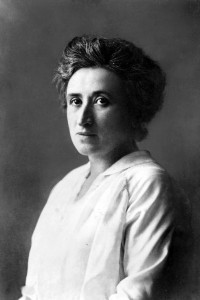
If I’m right – if the history of Jewish-Muslim relations really has been defined by economic prosperity and decline – what then? If it is true that, in times of wealth, both Jews and Muslims prosper financially, culturally and spiritually, what do we need to do?
The great Jewish prophet of socialist thought, Rosa Luxemburg, said that humanity has a choice between socialism or barbarism. We can have equality, in which case we can have strong communities, great art, and harmony between the religions. Or we can carry on with capitalism, in which case we’ll go on with occupation, war, terrorist attacks, fascist marches and murder. Look at our shared history and you’ll see that really is the choice facing us.
By socialism, I certainly don’t mean the monochrome drudgery of Stalinist Russia or the authoritarian state. I mean the socialism that our great thinkers, like Karl Marx, Emma Goldman and Esther Malke-Lipshitz envisaged: of prosperity for everybody, shared by everybody. We know that we do best when we were are wealthy. In a world where the top 1% can control wealth amounting to six times the value of the planet, is it really so inconceivable that we might share those millions equally and advance as one humanity?
Don’t for a moment think I’m reducing this to economics. I am not saying that if we just get socialism all our problems will be over. It’s not that a good distribution of wealth automatically results in cohesion. I’m saying that that is the precondition for coexistence. Without meaningful equality, people can’t meaningfully engage with each other.
We see so many efforts at interfaith, led by people clutching milky tea in polystyrene beakers, who seem to think that by the very fact of talking to each other they’re doing a humanity a service. Any real attempt to unite communities and eradicate prejudice has to be based in the actual political reality people face.
So, look at the real history of Jewish-Muslim relations and imagine a different future for us. Imagine if, instead of meeting up to make superficial statements about what our religions have in common, our community leaders instead built up a real common cause. Imagine if our rabbis and imams would unite to organise our communities to oppose austerity, fight racism and end all wars. Imagine religious movements that were actually motivated to bring down the structures of inequality that divide us.
It’s an ambitious suggestion. It’s drastic. But the alternative really is barbarism.
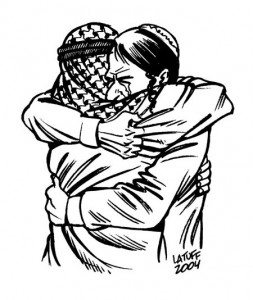





This is an interesting article with which I largely agree. One point where I do disagree is the statement that ‘European kings gave Jews despised positions, especially in money-lending, tax collection and administration’. It’s more complicated than that. Jews had already taken on trades which were allied to or a consequence of their original role as a trading people. This was not uncommon, many other peoples had been traders e.g. the Phoenicians. Being traders meant the use of money in a society based on use values. Jews, like the Venetian bankers and others in medieval times, accumulated money which was then lent out. It was seen as usury as opposed to the lending of productive capital in capitalism.
The trades I’m speaking of are e.g. goldsmiths, silversmiths, diamond cutters and traders. Medieval rulers certainly wanted Jews in their kingdoms e.g. Casimir the Great of Poland. Of course the Kings could also turn on them and they did when they couldn’t pay the debts back and then anti-Semitism would increase as the monarchs justified robbing the Jews. Incidentally when Jews fled Spain in 1492 they also escaped to Poland as well as North Africa.
Shalom.
All we hope is unity between brothers and cousin, its sad to see both with same blood fighting. when you say muslim the muslim word should not be used, cause many jewish in the presence of Mohamed have converted to islam how by his good behave toward them, and some they never want to write the good always put the lie and negative. Also Muslim are also Chinese at 650 or arround that year they became for most muslims, when we say muslim are whom practice and believes. you should say Arabs and Jewish , persian are not arabs, morrocan arent arabs they are berber and indigenous, phoenician were mixed with jewish and chinese blood.
you should put in the title Jewish and Islam more likely. not jewish muslim… the way they will understand that is jewish are muslim, and they arent wrong jewish christian who believes in messenger after life in God … are also Muslims , it is why we should stop aiming arabs and none arabs by the word muslim, muslim is also in the djin .. djin also had their own messenger with religion they are also christian or muslim or jewish not only human.
so my friend do not use Muslim , not all deserve this pride , but we all do our best to be good as asked us to be by our creator. again jewish believers and christian believers and orthodox ….. anyone believes in one god after life messengers …are muslims.
may peace and love be in our soul heart and mind toward all brothers and sisters.
Tony Greenstein & Max Bluementhal! No more to be said. #Fakenews #PostTruth
Early on in the article it speaks of “The Golden Ages” for Jews and Muslims. It would appear that this time wasn’t so golden for the people that were conquered, enslaved and/or turned into eunuch’s. So is it to say, that in order for times to be prosperous for the two main groups depicted in this article (Jewish and Muslim) it will come at a cost of others? Could it not be ascertained that the retaliation of these oppressed groups be one of survival? Having their own people non unified and impoverished, causing them to eventually unite and push back?
If this is the case, mankind – regardless of religious affiliation or birthright will only be “okay” if they are the ones flourishing with money and power. Possibly the better question is why greed is controlling all the religions of the world, when the written words of these religions are against such things.
Michael Guitouni you brought up some interesting points and that I plan to research.
We are the scapegoat.Our rabbinistic Judaism is the religion of the scapegoated on march. The peoples of the rival Abrahamic religions `ve created the culture of our scapegoating by permitting for us the occupations,clothing,beheviour, describing our features and inventing our psychology. Of course, we resist and dewelop our own scapegoat culture based mainly on justifications and moral superiority. It`s a pity we`ve got the secular culture from these people,that creates the connections with the West,that is so difficult to brake, but makes our lives more comfortable and happy.
The Jewish family was staying with the Muslim family after their home was destroyed in WWII, more than that, Muslim women were protecting Jewish women in Sarajevo. http://www.loonwatch.com/2013/11/muslim-woman-covers-the-yellow-star-of-her-jewish-neighbor-with-her-veil-on-the-streets-of-sarajevo-in-1941/
Good stuff